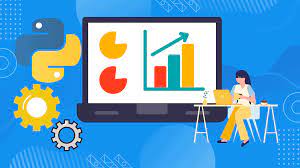
Introduction:
In the vast digital landscape, data is king. Businesses rely on data-driven insights to make informed decisions, gain a competitive edge, and enhance user experiences. Web scraping, the automated method of extracting large amounts of data from websites, has become a pivotal tool in this data-centric era. Python, a versatile and powerful programming language, stands out as a preferred choice for web scraping tasks due to its simplicity, flexibility, and robust libraries. In this article, we will delve into the benefits of using Python for web scraping and explore the ethical considerations surrounding this practice.
1. Understanding Python’s Simplicity and Versatility
Python’s intuitive syntax makes it accessible even to beginners. Its simplicity allows developers to write concise and readable code, reducing the time and effort required to develop web scraping scripts. Python’s versatility enables scraping data from various sources, including websites, APIs, and databases, providing a seamless experience for developers.
2. Robust Libraries for Web Scraping
Python boasts powerful libraries such as BeautifulSoup and Scrapy, specifically designed for web scraping. These libraries simplify the process of parsing HTML and extracting relevant data, enabling developers to focus on extracting insights rather than dealing with complex coding challenges. Additionally, these libraries support asynchronous processing, enhancing the speed and efficiency of web scraping tasks.
3. Handling Dynamic Content with Selenium
Many modern websites use dynamic content loaded through JavaScript. Python, in conjunction with Selenium, can interact with web elements, allowing developers to scrape data from dynamically generated pages. This dynamic content handling capability ensures that developers can access a wide array of websites, including those with interactive user interfaces.
4. Ethical Considerations in Web Scraping
While web scraping offers invaluable insights, ethical considerations are paramount. Developers must adhere to ethical practices to maintain the integrity of their scraping activities. It’s crucial to respect website terms of service, robots.txt files, and avoid overloading servers with too many requests. Ethical web scraping ensures a fair and respectful use of online resources.
5. Legal Implications and Compliance
Understanding the legal landscape is essential when engaging in web scraping activities. Some websites explicitly prohibit scraping in their terms of service. Others may provide APIs or data sets for public use. Developers must navigate these legal nuances and ensure compliance with copyright laws and intellectual property rights to avoid legal consequences.
6. Data Privacy and User Consent
Respecting user privacy and consent is non-negotiable. Developers must be cautious when scraping personal or sensitive information, ensuring that they have obtained the necessary permissions or that the data is publicly available and ethically accessible. Failure to adhere to data privacy regulations can lead to severe consequences, including legal actions and reputational damage.
Conclusion:
Python for web scraping offers unparalleled benefits in data extraction, automation, and analysis, making it a powerful tool for businesses and researchers. However, ethical considerations are paramount. Respecting website terms of service and privacy is essential to maintain integrity. When leveraging Python for web scraping, it’s crucial to work with a reputable Python development company. Their expertise ensures adherence to ethical guidelines, promoting responsible data usage and fostering trust in the digital landscape. By embracing Python responsibly and partnering with ethical developers, businesses can harness its potential while upholding ethical standards and integrity.
FAQs
1: Is web scraping legal?
Web scraping is legal as long as it complies with the website’s terms of service, respects copyright laws, and adheres to data privacy regulations.
2: Can Python handle scraping dynamic content?
Yes, Python, especially when used with libraries like Selenium, can effectively handle scraping dynamic content generated through JavaScript.
3: What are the consequences of unethical web scraping?
Unethical web scraping can lead to legal actions, damaged reputations, and loss of access to valuable data sources.
4: How can developers ensure data privacy in web scraping?
Developers should obtain user consent for scraping personal data, avoid scraping sensitive information without proper authorization, and adhere to data privacy regulations.
5: Are there alternatives to web scraping for obtaining data from websites?
Yes, some websites provide APIs or datasets for public use, offering a legal and ethical alternative to web scraping.


